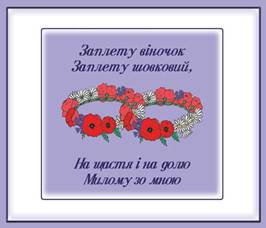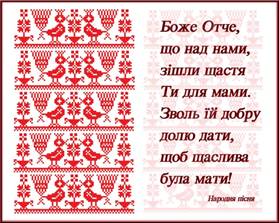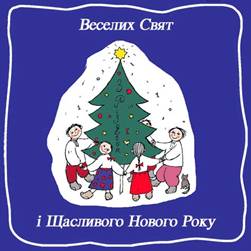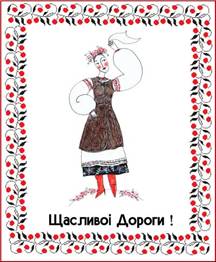
The focus of this lesson is reading for comprehension. You will also delve into the cultural meaning of luck or good fortune.
 |
У розмові ми чули: |
І тому мені треба негайно їхати.
|
 |
|
In this lesson you are introduced to the new adverb негайно (immediately, at once). The word негайно may be used as a synonym for зараз.
XIX. Exercise 4.i
Match the synonyms given below.
| учні |
_____ е-лист |
| на жаль |
_____ машина |
| бо |
_____ студенти |
| негайно |
_____ шкода |
| прошу |
_____ добре |
| е-мейл |
_____ ручка |
| перо |
_____ зараз |
| гаразд |
_____ тому що |
швидко |
_____ будь ласка |
| авто |
_____ скоро |
Reading for Comprehension
If you truly comprehend a text which you have read, you should be able to paraphrase or summarize the text in your own words. In order to do this, you need to know the meaning of most of the words which appear in the text. You have learned many new terms in Ukrainian, but do you comprehend them? It's time to check your comprehension skills.
XIX. Exercise 4.ii
Read the following text and focus on gathering its meaning. Use a dictionary if necessary. Then summarize what you have read in your own words.

Мій товариш Максим
Мій товариш Максим дуже щасливий хлопець, бо всі його люблять. Він також дуже гарний хлопець, але він усе забуває!
Ось учора він знову забув своє домашнє завдання вдома. А в понеділок він забув зошит, олівець і перо й не мав чим* писати, та не мав на чому* писати. Учительці це не сподобалось! Вона сказала: "От тобі учень! "
Я часто прошу його зайти до мене, бо я хочу грати з ним у шахи або робити домашню роботу. Він звичайно каже: "Добре, я зараз зайду!" Я чекаю й чекаю, але він забуває прийти!
У середу він забув взяти шкарпетки, бо спішив до школи. Так, він забув устати, аж мама сказала, що вже пізно! Певно, що всі студенти сміялися з нього!
Ще послухайте про суботу! Максим мав зайти до Меланії, бо вона хотіла піти з ним до кінотеатру. Максим забув, та зайшов до Одарки. Меланія ще до сьогодні не говорить до Максима!
І це ще не все про Максима! У вівторок його тато дозволив йому взяти мотоцикл до школи. І ви знаєте що? Максим забув мотоцикл у школі й пішов додому пішки!
І це ще не все! У четвер мама просила його зайти до крамниці по дорозі додому, щоб купити молока. Як звичайно, Максим забув, що мав купити, й купив сметани. Його мама каже, що він колись забуде свою голову!
Так, Максим – мій товариш, гарний хлопець і щасливий, що всі його люблять, але...
*Explanatory note:
...не мав чим...не мав на чому...he didn't have with what to write or on what to write
Summarize the reading in the space given below. ____________________________________________________________________________
____________________________________________________________________________
____________________________________________________________________________
____________________________________________________________________________
____________________________________________________________________________
____________________________________________________________________________
____________________________________________________________________________
____________________________________________________________________________

In Lesson 2 of Unit XIX, you reviewed the singular and plural endings of adjectives in three cases – Nominative, Accusative and Genitive. The remaining three Cases – Instrumental, Locative and Dative – are introduced below.
You will not need to learn all of these endings at this point in your course, but rather, you are asked to become aware of the endings and to continue to use the charts as needed to complete practise exercises and assignments. As you work with these endings, you will gradually become more familiar with the changes for each specific case.
Орудний відмінок
|
чоловічий
-им |
жіночий
-ою |
середній
-им |
множина
-им |
щасливим (хлопцем, папером) |
щасливою (мамою) |
щасливим ( місцем ) |
щасливими (хлопцями, паперами, мамами, місцями) |
Місцевий відмінок
|
чоловічий
-ому |
жіночий
-ій |
середній
-ому |
множина
-их |
щасливому (хлопцеві, папері)
|
щасливій (мамі) |
щасливому (місці) |
щасливих (хлопцях, паперах, мамах, місцях) |
Давальний відмінок
|
чоловічий
-ому |
жіночий
-ій |
середній
-ому |
множина
-им |
щасливому (хлопцеві, папері)
|
щасливій (мамі) |
щасливому (місці) |
щасливим (хлопцям, паперам, мамам, місцям) |
XIX. Exercise 4.iii
Complete the phrases with the correct form of one of the adjectives given in the box. The questioning words will help you to identify the case of the adjective-noun phrase.
| старий |
молодий |
український |
щасливий |
| приємний |
зелений |
червоний |
новий |
| полтавський |
синій |
сонячний |
канадський |
1. ____________ дідусь
(кому) Я написав листа ____________ дідусеві.
2. ____________ вчителька
(кому) Ми кажемо ____________ вчительці «Доброго дня, панно Вівчар!»
3. ____________ школа
(де) Допоможімо вчителям у цій ______________ школі!
4. ____________ сини
(кому) Тато купив новий комп'ютер ______________ синам.
5. ____________ учитель
(з ким) Ми розмовляли з _______________ учителем.
6. ____________ цибуля
(з чим) Баба любить їсти салату з _____________ цибулею.
7. ____________ перо
(чим) Звичайно, вчителі пишуть свої коментарі _____________ пером.
8. ____________ велосипеди
(чим) Надворі тепло й діти поїхали до школи ____________ велосипедами.
9. ____________ танець
(де, у чому) Кроки широкі у __________________ танці.
10. __________ вода
(де, у чому) Ми бачили рибу у ______________ воді.
11. _________________ небо
(де, на чому ) Вони не бачили хмар на ____________________ небі.
12. _________________ школи
(де) У ____________________ школах є багато комп'ютерів.
XIX. Exercise 4.iv
Fill in the correct adjective-noun phrase in each sentence.
1. 
центральної бібліотеки, центральну бібліотеку, центральній бібліотеці, центральну бібліотеку
Називний: Це центральна бібліотека у Саскатуні.
Знахідний: Я читала про ______________ _____________
Родовий: Завтра діти йдуть до _______________________
Давальний: Завтра я позичу книжку з ____________________
Місцевий: Влітку я хочу працювати у ____________________
2. 
молодому вчителеві, молодого вчителя, молодим вчителем, молодого вчителя
Називний: Пан Боднарчук – молодий вчитель.
Знахідний: Студенти говорили про ____________________
Родовий: Я не знаю цього _____________________
Давальний: Учні подякували ___________________ за цікаву лекцію.
Орудний: У вересні ми їдемо до Квебеку з __________________
3. 
нового крісла, новому кріслі, новим кріслом, нове крісло
Називний: Ось наше нове крісло, ми купили його вчора.
Знахідний: Скільки коштує це ___________________ ?
Родовий: Ми не маємо _____________________ в клясі.
Орудний: Мама задоволена комп'ютером і ___________________
Місцевий: На ____________________ сидить дід.
4. 
великими дверми, великих дверях, великі двері, великих дверей
Називний: Ці великі двері дуже дорогі.
Знахідний: В музеї можна бачити гарні _________________
Родовий: Ми не маємо _______________ у школі.
Орудний: Мої батьки купили нову хату з ___________________
Місцевий: На ___________________ не було номера.
 Cultural Notes Cultural Notes
The adjective щасливий is derived from the noun щастя. In Ukrainian, this noun has several cultural interpretations which are important to note:
• good fortune + happiness
• luck + happiness
• success + happiness
If you've had the opportunity to purchase a Ukrainian greeting card for a birthday, wedding or anniversary, you may have noticed that well-wishes often include the words щастя or щасливий. Here are a few examples of electronic greeting cards, taken from the website Babyna Skrynia.
 
Wedding 'Shower' : I will weave a wreath, a silken wreath
To bring success and good fortune
To me and my beloved. |
Mother's Day: Almighty God above, shower our mother with good fortune and bring
her much luck and success! |
Certain English phrases take on a cultural meaning when translated into Ukrainian. Below, the common English phrase is given first, followed by the meaning which is conveyed in the Ukrainian cards.  
Common English Greeting: Merry Christmas and Happy New Year!
Ukrainian Interpretation: Happy Holidays and Good Fortune (Success) in the New Year! |
Common English Phrase: Happy Travels! Safe Journey!
Ukrainian Interpretation: Successful Journey! Good Fortune in Your Travels! |
| |
|
You'll notice that in popular English greetings, happiness is a very important part of the message. In Ukrainian, the word щастя is the combination of good fortune, luck or success, all leading to happiness in one's life.
XIX. Exercise 4.v
Some popular Ukrainian greeting card verses are given below. Using your dictionary, translate the meaning to the best of your ability. Note that each verse includes the word щастя or a form of the adjective щасливий.
ДЕНЬ НАРОДЖЕННЯ |

|
Бажаємо довгих, щасливих літ прожити на многії літа! |
|
ДЕНЬ НАРОДЖЕННЯ |

|
В день народження,
сердечний привіт!
Щастя, здоров'я,
та многих літ! |
|
ВІНЧАННЯ (ВЕСІЛЛЯ) |

|
Вітаємо вас,
любі молодята,
Щасливим шлюбом,
сімейним святом! |
|
ЮВІЛЕЙ |

|
Хай сьогоднішнє радісне свято розмножить Ваше щастя й віру в майбутнє! |
|
Create your own Ukrainian greeting card verse below.
XIX. Exercise 4.vi
Complete the sentences below.
1. Мій день щасливий, коли
____________________________________________________________
2. Мій день нещасливий, коли
____________________________________________________________
3. Моя мама (або баба) щаслива, коли
____________________________________________________________
4. Мій тато (або дід) нещасливий, коли
____________________________________________________________
5. Мій приятель щасливий, коли
____________________________________________________________
6. Моя приятелька нещаслива, коли
____________________________________________________________
7. Учителі щасливі, коли
____________________________________________________________
8. Учні нещасливі, коли
____________________________________________________________
|










 Cultural Notes
Cultural Notes 








